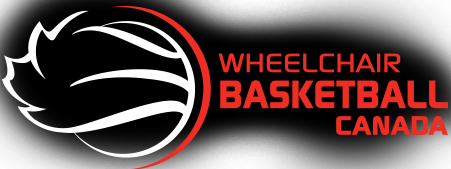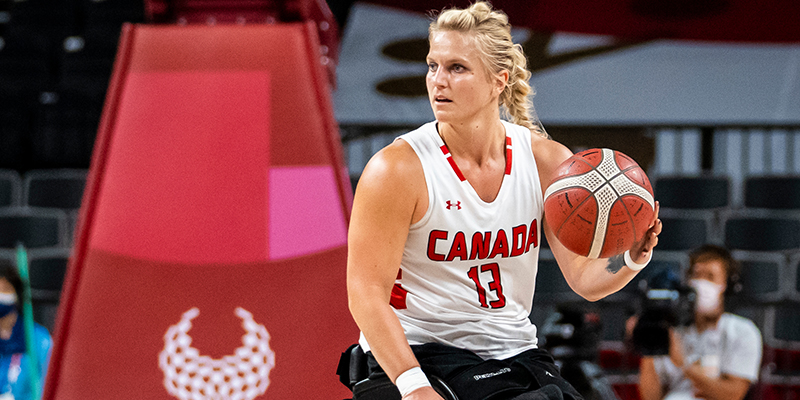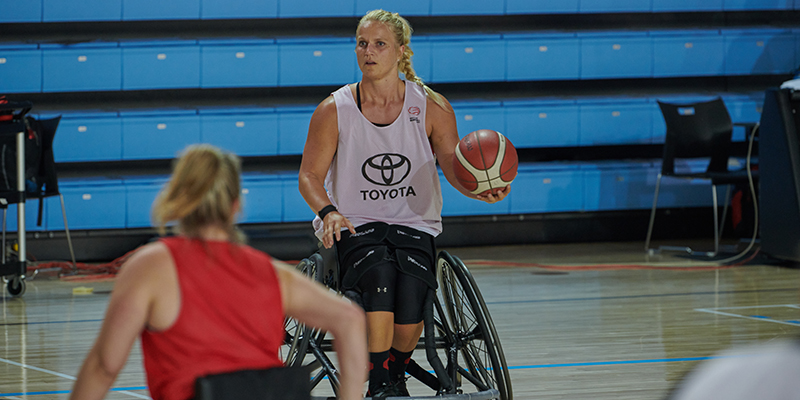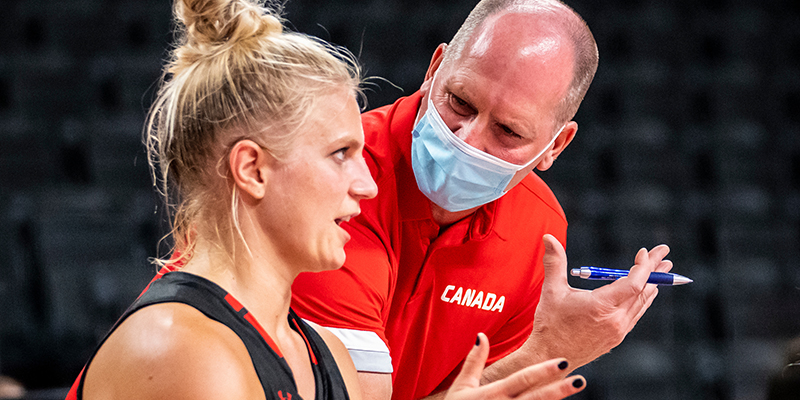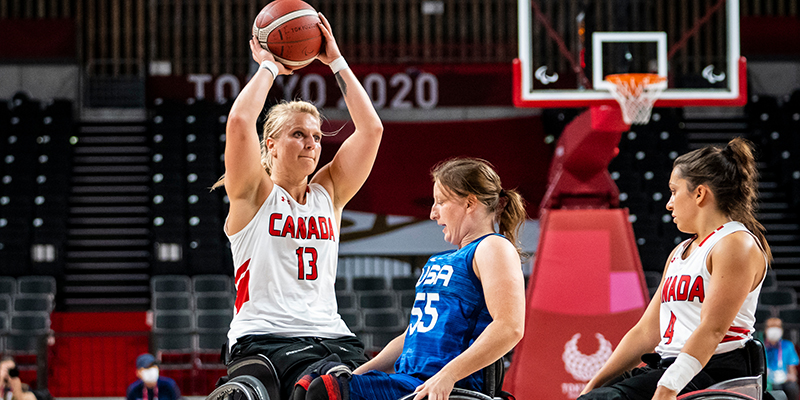Kady chronicles her journey from growing up on Pender Island, playing stand-up ball at UNBC, and discovering Wheelchair Basketball in this month’s Athlete Spotlight presented by Toyota.
Growing up on Pender Island was awesome. We would play outside all day and were basically allowed to roam free. We would just run out into the forest and be out there for like four or five hours just doing whatever we wanted.
My dad would build us rope swings and forts and stuff; it was great. In the summer, we’d be dropped off at the lake, the beach—in my family, me and my sisters we were very much outdoors kids, that’s what we did.
The first sport I ever played was baseball. I started playing when I was about seven or eight. I played it throughout high school on all boys’ teams. Then, I kind of switched my focus when I was about 13 or 14, I started focusing more on basketball.
Finding basketball
One of my older sisters her friend’s parents started this basketball night for all the older kids to come play, it was on Wednesday nights and I would just usually tag along with my sister, probably annoyed her. I was fascinated by all things athletics. I would just watch, and occasionally they let me run around and try and play. That was my first like, ‘oh, this game, okay.’
Once I started playing, I kind of started finding every avenue I could to keep playing, trying to find all sorts of camps to go into and different leagues. I played throughout high school; I was lucky enough to be recruited out of high school to play at university and played out my university eligibility.
I decided to go to the University of Northern British Columbia because they offered me academically what I was looking to get into. When I went and did my recruiting visit there, I just got a good feeling from it.
That’s one thing I’ve never regretted because I had a great time. It’s a wonderful program; I highly recommend it to anyone. Prince George is actually a great place. I felt super welcome there by the entire community. They’re really big into university sports, which makes for a great experience as an athlete. I was really happy with that decision.
I graduated with a Bachelor of Health Science, and my major was biomedical studies.
It was a normal game; it was a 2-on-1 play, I went by the defender, went up for the layup, and she was trying to stop my shot. I got pushed, and I was in the air already, so when I landed, I stuck my leg out because I didn’t want to fall, but then I just kind of kept twisting, kind of an athletic faux pas. The theory was that it was just a partial ACL tear at the time.
I rehabbed, was feeling better, but wasn’t feeling quite 100 per cent. I came back for our last two league games and played okay.
Then we were preparing for our playoff tournament.
The week before, we were just in practice, and I was cutting through the key and looking over my shoulder for a pass. I was just running through the key, moving to the pass, and I just remember one second, I’m looking for the ball, and then the next, I’m on the ground in some of the most excruciating pain I’ve ever been in.
I think everyone knew that there was something very wrong because that kind of pain doesn’t happen over nothing. I think it was a couple of weeks later when I finally got an MRI.
It ended up being a complete ACL tear, MCL tear, my meniscus was torn apart, and I also had a fracture on the medial femoral condyle—that’s the thing that causes me the issues now.
At that point, I didn’t think I would not play again. I was like, ‘Okay, I need to get the surgery, fix it, and I don’t see any reason why I don’t return to my full force, playing the way I used to.’ But, unfortunately, as we all know, that was not the case.
I ended up having surgery in June, and then I had to take the following year off.
I ended up going back to my surgeon because it didn’t feel quite right, and he went in again and found that my meniscus had a big tear in it. Right before I was about to make the decision to not play the season, I had slipped on it when I was in practice, and it wasn’t anything significant, but it was enough that I was like, ‘that’s not right.’ It didn’t hurt, really, but I just knew it wasn’t the right movement. My surgeon went in with a scope and found out that I had actually had a really large, what’s called bucket handle tear in my meniscus, and it would need to be repaired surgically.
Once that was done, I was feeling a bit better.
I was super rusty when I first came back, and it was really frustrating because it was stuff I couldn’t practice. I tried to do as much as I could when I was on the sidelines at practice: I’d be practicing my ball-handling—doing as much stuff as I could to make sure that I was as ready as I could be when I got the all-clear. There are just some things that you can’t replicate.
Eventually, when I got back into it, there was a point there for a while that I was like, ‘oh, yeah, I think I’m feeling good. I feel like I’ll be right back to where I was.’
Then that year, it was in our playoff tournament I kind of rolled on that knee again. I was sliding in front of an offensive player, and I was trying to stop them and my knee just kind of did this thing, and I was like, ‘that wasn’t right.’
That one actually hurt. I remember coming off and just being really upset because something went wrong again, and at that point, I had been really confident in it and thinking it was going to be good.
From that point on, it was basically I play a bit; it would get injured, I’d rehab it, come back, play, get injured. It was basically that cycle for the rest of my career. I just could not keep it healthy no matter what I did. I must have spent all my free time in physiotherapy. I was their best customer. Eventually, I couldn’t keep it healthy. It wasn’t that I wasn’t doing enough, it was just that’s where I’m at. It just wasn’t in the cards for me anymore, and that broke my heart.
Discovering Wheelchair Basketball
Tim Frick lives on Pender Island, that’s how I came to know him. He’s actually known me since before I got injured. He organized the basketball program for the kids on Pender, and I would help out with that in the summers. He would talk to me about Wheelchair Basketball before I was ever injured. Then when I did get injured, he kind of was like, ‘well, maybe you’d be able to play Wheelchair Basketball.’
At first, I was like, ‘no, I’m fine, I’m going to be fine, I’ll play again, no worries.’ He would just kind of throw it out there every now and again. I was still so focused on regaining my stand-up career. After a while, I was needing another surgery, and I didn’t know when I was going to get it.
I had already finished playing at university, I’d finished my five years, and I was still waiting on surgery. I think it was late 2015, and Tim just asked me ‘what are you doing this Saturday?’ I didn’t really have plans. He was like, ‘cool, there’s a Wheelchair Basketball camp that I’ve signed you up for, so you’re going to go.’
It was a beginner camp. There were people who’d been playing before, but then there was a bunch of us who’d like, never tried it. I was watching everyone do all these moves, and I was like, ‘I don’t know how you’re doing that.’
I was trying to push the chair just using the push rims. I was going down the court just using the push rims, and then I remember the first time I’d ever met Marni Abbott-Peter, she came up to me while I was trying to do two push stops and was like, ‘umm, you can push on the tires too, it’s a lot easier than trying to use the push rims.’
I did that camp; there was so much to like. I didn’t really have any expectations for it, so I was able to have a good time.
Then Tim told me there was another camp in Vancouver and that there was going to be games. It was a women’s camp and tournament. They had a development side and then games for the experienced players and provincial teams.
Tim said I’d do some stuff on the development side, and then maybe I’ll be able to get into an actual game. I went over with him, and this was just my second time trying it. I ended up getting thrown into the games the whole time.
I was on the development side; I didn’t even know the rules or any kind of strategy. Now, I know that the rules are basically the same thing, but, in the moment, it just felt like this foreign situation.
Other players were stopping chairs, and I had no idea what was going on. I remember I got back picked by one of the girls, she played for Team Canada at the time, and I had no idea what back picking was.
I was trying to get down the court, and she was in my way. I was trying to go around her, and she kept stopping me. I’m like, ‘What are you doing? Get out of here. Let me move.’ Simon Cass was on the sideline, and he was yelling to the girl, ‘come on, it’s her first day.’ I was sitting there so confused.
Then Tim helped me train for Nationals. We would train every day. I was working for my dad at the time, after work, I would come in, and Tim and I would get time in the gym. For two hours, he would run me through drills.
After I went to the national tournament, a month later, the women’s head coach at the time, Bill Johnson, pulled me aside and asked if Wheelchair Basketball was something I was interested in. He suggested that possibly I could one day play for the national team. I was like, ‘Oh, my god, really? That’s an option?’ I think that’s when I first was like, ‘wow, this could actually be my second chance.’
I had all these goals for stand-up, after playing at university, I wanted to keep going, possibly go overseas and play. I had had all those goals and aspirations, and they were kind of stripped away.
Wheelchair Basketball was this floodlight of all my goals and aspirations coming back, opening the gates being like, ‘oh my god, like I can actually be a high-level athlete again.’ I could actually play sport competitively and, not just sport, I could play basketball again, at a world-class level.
It was honestly one of the best things that happened. That was kind of like that moment where I was like, ‘Oh, my god, yeah, I’m all in here. If this is a chance for me, absolutely I’m going to give it everything I’ve got.’ That’s when I realized what this could be for me. From there, I just took off running and never looked back.

